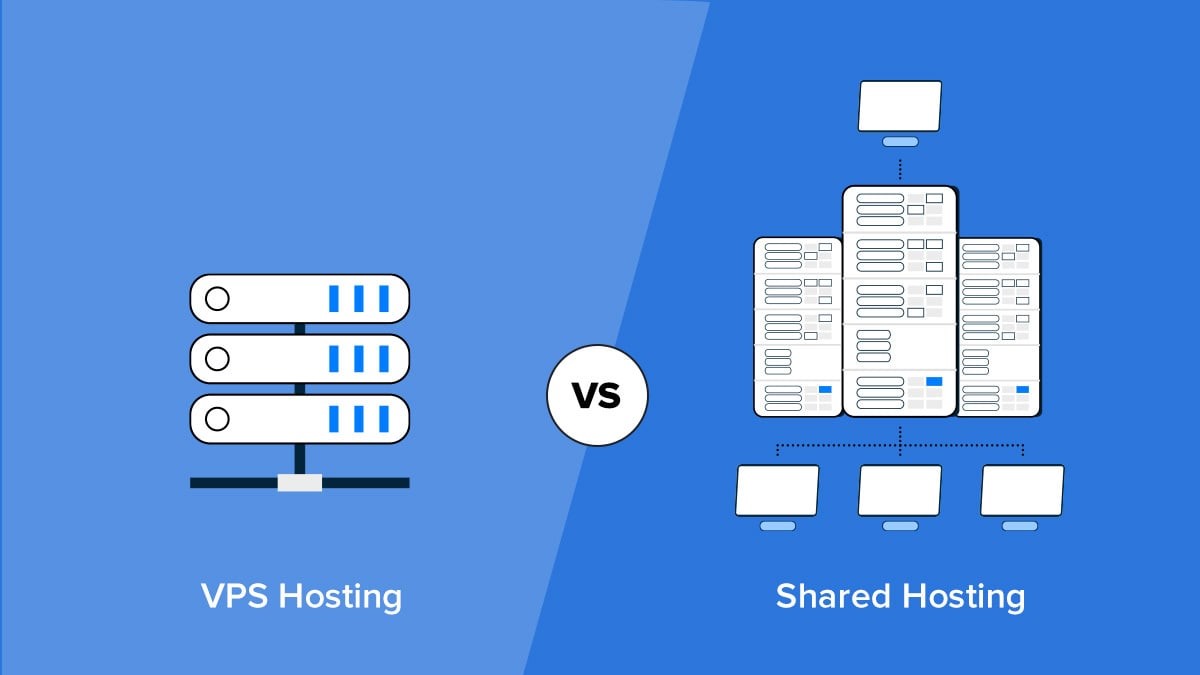
Shared Hosting vs. VPS Hosting: Which Is Right for You?
Choosing the right hosting solution for your website is crucial, as it can significantly impact its performance, security, and scalability. Among the various options available, shared hosting and VPS (Virtual Private Server) hosting are two popular choices for individuals and businesses alike. In this article, we’ll explore the differences between shared hosting and VPS hosting, their pros and cons, and help you determine which option is best suited to your needs.
Shared Hosting:
Shared hosting is a type of web hosting where multiple websites are hosted on a single server. In this setup, resources such as CPU, RAM, and storage space are shared among all the websites on the server. Shared hosting is typically the most affordable option and is ideal for small websites, blogs, and personal projects with low to moderate traffic.
Pros of Shared Hosting:
- Cost-Effective: Shared hosting plans are budget-friendly, making them ideal for individuals and small businesses with limited budgets.
- Ease of Use: Shared hosting providers usually offer user-friendly control panels, such as cPanel or Plesk, making it easy to manage your website, email accounts, and other hosting features.
- Maintenance-Free: With shared hosting, the hosting provider is responsible for server maintenance, security updates, and technical support, allowing you to focus on managing your website content.
- Scalability: Many shared hosting plans offer scalability options, allowing you to upgrade your resources as your website grows.

Cons of Shared Hosting:
- Limited Resources: Since resources are shared among multiple websites, performance may be affected if other sites on the server experience high traffic or resource usage.
- Less Control: With shared hosting, you have limited control over server settings and configurations compared to other hosting options.
- Security Concerns: Security vulnerabilities in one website on the server can potentially affect other sites, making shared hosting less secure than dedicated or VPS hosting.
VPS Hosting:
VPS hosting is a more advanced hosting solution where a physical server is divided into multiple virtual servers, each with its own dedicated resources and operating system. This provides users with greater control, flexibility, and scalability compared to shared hosting.
Pros of VPS Hosting:
- Dedicated Resources: With VPS hosting, you have dedicated CPU, RAM, and storage resources, ensuring consistent performance and uptime for your website.
- Root Access: VPS hosting provides root access or administrative control, allowing you to customize server settings, install software, and configure security measures according to your specific requirements.
- Improved Security: Since each VPS operates in its own isolated environment, security risks are minimized compared to shared hosting. You are less likely to be affected by security breaches or malware infections on neighboring servers.
- Scalability: VPS hosting offers scalability options that allow you to easily upgrade or downgrade your resources as needed, making it suitable for growing websites and businesses.
Cons of VPS Hosting:
- Higher Cost: VPS hosting plans are generally more expensive than shared hosting plans, making them less suitable for individuals or small businesses with limited budgets.
- Technical Knowledge Required: Managing a VPS server requires technical expertise, including knowledge of server administration, operating systems, and security practices. This may be challenging for users with limited technical skills.
- Responsibility for Maintenance: With VPS hosting, you are responsible for managing server updates, security patches, and backups, which requires time and effort on your part.
Which Is Right for You?

Choosing between shared hosting and VPS hosting depends on your specific needs, budget, and technical expertise. Here are some guidelines to help you make the right decision:
- Choose Shared Hosting If:
- You have a limited budget and need an affordable hosting solution.
- You are running a small website, blog, or personal project with low to moderate traffic.
- You prefer a hosting solution that is easy to set up and requires minimal technical maintenance.
- Choose VPS Hosting If:
- You require dedicated resources and consistent performance for your website or business applications.
- You need root access to customize server settings and install custom software.
- You prioritize security and want to minimize the risk of security vulnerabilities or performance issues caused by other websites on the server.
- You have the technical expertise to manage and maintain a virtual server effectively.
In conclusion, both shared hosting and VPS hosting have their advantages and disadvantages, and the right choice depends on your individual requirements and preferences. Evaluate your needs carefully and consider factors such as performance, scalability, control, and security before making a decision. With the right hosting solution in place, you can ensure optimal performance and reliability for your website or online business.